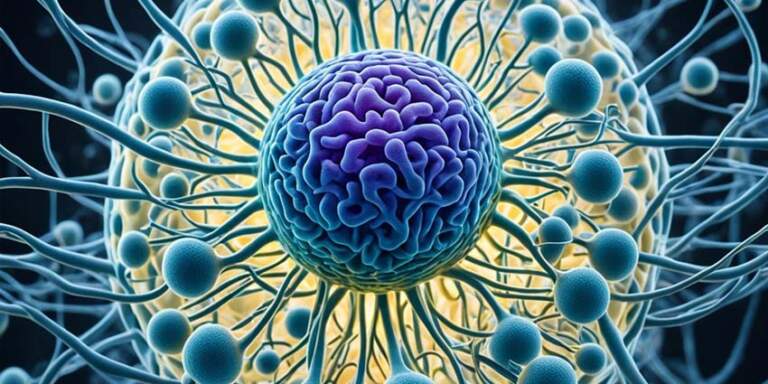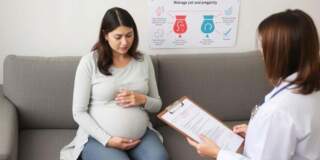Did you know a healthy couple in their 20s and early 30s has a 25 to 30 percent chance each month to conceive? This statistic shows how vital it is to know what affects your pregnancy chances. About 75 to 85 percent of couples conceive within a year. This means careful planning and positive habits can really help. Your age and health, plus tracking fertility, are key to a healthy pregnancy journey.
Key Takeaways
- Understanding your menstrual and ovulation cycles is vital for successful fertility tracking.
- A balanced diet, regular exercise, and proper hydration significantly boost reproductive health.
- Maintaining an ideal weight enhances your chances of conception and healthy pregnancy.
- Reducing stress and quitting unhealthy habits like smoking and heavy alcohol consumption are critical.
- Consulting a healthcare provider for preconception visits and checkups can provide personalized advice and assistance.
Understanding Your Ovulation Cycle
Ovulation is essential for getting pregnant. It’s when an egg gets ready and is released from the ovary. It mostly happens between day 11 and 21 of your cycle. Knowing when you ovulate helps plan the best time for trying to have a baby.
The Menstrual Cycle Explained
The menstrual cycle is about 28 to 35 days long for most. Ovulation often occurs 12 to 14 days before the next cycle starts. A hormone surge causes ovulation about 36 hours before the egg comes out. The best time to get pregnant includes the five days before ovulation occurs and the day after.
Women have 1-2 million eggs at birth. However, only 300 to a sperm count and 400 are released during their lives.
Timing Intercourse with Ovulation
Sperm can survive in a woman’s body for 3 to 5 days. So, having sex regularly a day or two before ovulation can increase the chance of pregnancy. For the best results, try during your fertile window either daily or every other day.
If your periods are irregular, talking to a women’s healthcare provider or fertility expert might help. This is especially true if you’re under 35 and have been trying for a year, or over 35 and trying for six months.
Ovulation Predictor Kits
Ovulation predictor kits (OPKs) are helpful for tracking fertility. They detect the surge in luteinizing hormone (LH), indicating ovulation will happen soon. OPKs improve the timing for intercourse to increase pregnancy chances.
Along with OPKs, checking your basal body temperature and cervical mucus changes helps predict your fertile days. These methods offer additional ways to identify the best time for conception.
Adopting a Healthy Lifestyle
Starting your journey to conception can feel big, but a healthy lifestyle improves your odds. Focusing on a healthy diet, exercise, and drinking enough water is key. These factors are important for fertility in both partners, leading to a healthier pregnancy and baby.
Importance of a Balanced Diet
Eating a balanced diet helps with your reproductive health. Add leafy greens, cereals, and foods high in folic acid, iron, and zinc to your meals. This promotes a healthy living style and boosts fertility. The Centers for Disease Control and Prevention (CDC) recommend taking prenatal vitamins, such as folic acid, for disease control and preventing birth defects. Also, taking a prenatal vitamin or vitamins with at least 400 micrograms of folic acid is recommended. Do this one month before trying to get pregnant and during the first 12 weeks of pregnancy.
Taking at least 400 mg of folic acid daily, three months before trying, can reduce birth defects risks.
The Role of Regular Exercise
Exercising regularly is good for keeping a healthy weight, which helps with fertility. You should do 150-300 minutes of moderate exercise or 75-150 minutes of hard exercise weekly before trying to get pregnant. However, too much exercise can be bad for fertility. A balanced exercise routine is crucial for your health and for getting pregnant.
Hydration and Its Impact on Fertility
Being well-hydrated is very important for a healthy life and fertility. You should drink 8-10 cups of water every day. This keeps the cervical fluid, important for getting pregnant, in good condition. Not drinking enough water can affect your health and fertility. So, make sure you drink plenty of water to increase your chances of getting pregnant and to stay healthy.
Maintaining an Ideal Weight
Maintaining an ideal weight is vital for boosting your chances of getting pregnant. Being either overweight or underweight can affect your reproductive health.
Effects of Being Overweight
Being overweight can harm your hormonal balance and menstrual cycle. Excess estrogen, which obesity often causes, can stop ovulation and lead to an increased risk of health problems that may affect fertility and complicate pregnancy outcomes. Studies link obesity to a 12 percent rise in infertility, mainly from hormonal problems.
A BMI between 25.0 and 29.9 means you’re overweight. A BMI of 30 or more is considered obese. If you’re pregnant and overweight, aim to gain 15 to 25 pounds. Obese individuals should try for 11 to 20 pounds.
Risks of Being Underweight
Being both overweight and underweight women also has risks, like stopping ovulation and causing irregular periods. A BMI under 18.5 is underweight, harming ovulation. A healthy BMI ranges from 18.5 to 24.9, needed for regular ovulation.
For those at an ideal weight, gaining 25 to 35 pounds during pregnancy is the goal. Achieving this balance helps anyone looking to get pregnant by ensuring a healthy reproductive system. Always get advice from a healthcare provider for your particular needs.
Reducing Stress for Better Reproductive Health
Stress is key to your reproductive health. Whether starting your conceiving journey or in fertility treatment, managing stress is vital. High stress levels affect how patients deal with their treatment. Some might seek more treatment, while others feel alone and give up.
Studies show women with more stress have a 12% lower chance of getting pregnant. This shows how vital managing stress is. Activities like acupuncture, meditation, yoga, and guided imagery can help you feel in control and better overall.
Managing stress isn’t about getting rid of it completely. It’s about finding ways to lessen it. Everyone is different, so personalized ways are key. Ways to reduce stress include:
- Acupuncture
- Guided imagery
- Meditation
- Yoga
Getting support from friends and family is also important. They should offer understanding, not just tell you to relax. This approach can help more.
More research is looking into stress and fertility. Early results stress the need for stress-relief in our daily lives. Efficient stress management can greatly aid your conception journey.
Prenatal Care and Preconception Visits
Before trying to have a baby, it’s key for partners to get prenatal care. They should also schedule visits focused on preconception. This offers thorough health checks to make the path to pregnancy smoother.
Importance of Medical Checkups
Preconception visits include crucial medical checkups. These identify health problems that might affect getting pregnant or the pregnancy itself. Conditions like high blood pressure, diabetes, or thyroid issues can make getting pregnant harder.
Regular medical checkups are a must. Your healthcare provider can make sure you’re in good health. Or, they can start treatments or suggest changes in your lifestyle right away.
Vaccinations and Folic Acid to Consider
It’s vital to update your vaccinations before trying to conceive. Discontinuing birth control can delay the return of fertility, making it important to plan your vaccinations accordingly. Shots for diseases like chickenpox and rubella are especially important. These illnesses can cause serious issues for your baby if you’re pregnant. Being up-to-date with your shots protects you and your future child.
Genetic Screening and Family Health History
Genetic screening and knowing your family health history are crucial for a safe pregnancy. Doctors might do tests to look for inherited health problems. Knowing your family’s health history can alert you to possible genetic issues. This helps plan for a healthier pregnancy.
By focusing on prenatal care and booking preconception visits, you’re taking steps to tackle health concerns. You’re also making sure your vaccinations are current, and learning from genetic tests and family history. All these steps lead to a better chance of having a healthy baby.
Quitting Unhealthy Habits
To boost your chance of having a baby, it’s vital to stop bad habits. This means no smoking, drinking less alcohol, and not too much caffeine intake or much coffee.
Impact of Smoking on Fertility
Stopping smoking or vaping is critical for those wanting to get pregnant. Studies show that smoking can lower a woman’s fertility by as much as 40%. It impacts sperm quality too.
Cigarettes and vaping are harmful substances that mess with hormone levels and damage the female reproductive tract and organs. Smoking can also damage reproductive organs, affecting sperm DNA and raising the risk of miscarriage and birth defects.
Effects of Alcohol and Caffeine Intake
Drinking less alcohol is also crucial. Alcohol can worsen egg quality and decrease pregnancy chances. High alcohol intake messes with hormones and ups miscarriage risks. Try to cut down or stop drinking if you’re trying to conceive.
Watching your own caffeine consumption is important too. Too much caffeine can make getting pregnant harder and increase miscarriage chances. Many experts say to keep caffeine under 250 mg daily to help with getting pregnant. Changing these habits can greatly improve your chances of conception.
Exploring Assisted Reproductive Technologies
For couples facing fertility challenges, assisted reproductive technologies (ART) offer alternative paths to having a baby. These medical procedures aim to help people become pregnant. They include methods like In Vitro Fertilization (IVF) and Intrauterine Insemination (IUI).
In Vitro Fertilization (IVF)
IVF is the most known type of ART. It takes eggs from a woman’s body and mixes them with sperm in a lab. The first successful baby born using IVF was in England, 1978. It’s a choice for fertility issues, like tubal problems, male infertility, and low ovarian reserve.
IVF helps with fertility problems, not just with infertility. It also helps with preimplantation genetic testing and cryopreservation to preserve fertility. It is also for those who want to have children later on.
Intrauterine Insemination (IUI)
IUI puts sperm right into a woman’s uterus to help with fertilization. It’s simpler than IVF. IUI is often the first step for mild male infertility or when the cause of infertility is unknown. Many couples find success with this method, making it a popular choice.
Other Assisted Reproductive Technologies
There are more ART options beyond IVF and IUI, like Gamete Intrafallopian Transfer (GIFT) and Zygote Intrafallopian Transfer (ZIFT). Pelvic inflammatory disease is one of the gynecological conditions that could interfere with pregnancy, highlighting the importance of addressing such health issues before attempting to conceive and may necessitate the use of ART. GIFT puts eggs and sperm into the fallopian tubes to fertilize there. ZIFT places a fertilized egg into the tubes. Another key method is Preimplantation Genetic Diagnosis (PGD), which checks embryos for genetic issues before putting them into the uterus.
Each ART method uses special tools like incubators and microscopes. Teams of specialists like reproductive endocrinologists and embryologists help patients. They are fertility specialist who provide care and support throughout the process.
Fertility Tracking and Charting
Fertility tracking helps you find the best time to try for a baby. It uses methods that catch your most fertile times. Techniques like checking basal body temperature, cervical mucus, and fertility apps are key.
Basal Body Temperature (BBT)
Checking your basal body temperature (BBT) is a smart way to spot ovulation. After you ovulate, your temperature slightly rises. This signals a good time to aim for conception.
For a 28-day cycle, ovulation often happens around day 14. For a 33-day cycle, it’s around day 19. Keeping track of your BBT changes predicts when you’ll ovulate next. This helps plan the best times for baby-making efforts.
Monitoring Cervical Mucus
Checking cervical mucus is vital for fertility planning. Monitoring cervical mucus can help identify risks for complications such as preterm birth. As ovulation nears, the mucus becomes clear, stretchy, and slippery. It looks a lot like raw egg whites. This is when you’re most likely to get pregnant.
By watching how your cervical mucus changes, you can pinpoint peak fertility times. The appearance, flow, and texture of the mucus tell you a lot about your fertility health.
Using Fertility Apps
Technology has made fertility apps very helpful. They let you log your BBT and cervical mucus. And, they give predictions on when you’re likely to ovulate. Apps like Kindara are great for finding your fertile window.
Using these apps, alongside other tracking methods, gives you a full fertility plan. It’s customized to your body’s cycle.
In conclusion, using methods like BBT tracking, cervical mucus watching, and fertility apps improves your fertility knowledge. It greatly increases your chances of getting pregnant.
Tips for Conception
The journey to conceive is both exciting and a bit scary. Using key tips can greatly boost your chance of getting pregnant.
Frequent Intercourse
It’s vital to have regular intercourse to up your chances of conceiving. Aim for sex at least three times a week. The best chance to get pregnant is by having sex daily or every other day during your fertile window. This window usually falls around day 14 of your menstrual period in a 28-day cycle.
Best Sexual Positions
Though no scientific proof shows that some positions work better for conception, keeping it enjoyable and stress-free is important. Many opt for positions like missionary for deep penetration. It’s thought to get sperm closer to the cervix.
Choosing Fertility-Friendly Lubricants
Normal lubricants may slow sperm down. It’s better to use fertility-friendly ones like Pre-Seed or even natural ones like canola oil. Lying down for about 15 minutes post-sex may help sperm reach the uterus.
By adding these conception tips to your life, you’re more likely to get pregnant. Staying healthy, managing stress, and knowing your body’s cycles also help a lot.
Conclusion
Starting the journey to pregnancy is exciting but can also feel overwhelming. Knowing how fertility works and taking steps to improve your chances are key. This guide offers important advice—from tracking when you ovulate to making healthy lifestyle changes.
Being consistent with your efforts is very important. This means having sex often, especially when you’re most likely to get pregnant. Since sperm can live inside a woman’s body for up to five days, regular sex raises your chances. Using the right kind of lubricants and staying hydrated helps too.
Your lifestyle has a big impact on getting pregnant. Eating well, exercising, and keeping a healthy weight are crucial. Stay away from smoking and too much alcohol. Also, too much caffeine isn’t good. High stress can make it harder to get pregnant, so try to relax. Talk and support each other on this journey.
If trying the natural way doesn’t work, asking for medical help is a smart move. Doctors can offer special help, boosting your chances to have a baby.
FAQ
What are some essential tips for boosting my chances of conception?
Improve your conception chances by tracking fertility and knowing your health. Eat well, time intercourse right, and lower stress. This approach can make a big difference.
How does the ovulation cycle work?
Ovulation sees the release of an egg about two weeks before menstruation. Knowing your fertile window improves conception odds. It’s a key time for trying to get pregnant.
How can I track my fertility effectively?
To track fertility well, use ovulation kits and note basal body temperature. Also, watch for changes in cervical mucus. These methods provide clarity on fertile days.
What lifestyle changes can improve my fertility?
Lifestyle tweaks can boost your fertility. Adopt healthy eating, exercise, and weight control. Reducing stress and avoiding bad habits like smoking also play a role optimizing natural fertility.
How does body weight affect fertility?
Your weight impacts fertility. For overweight women, hormonal issues may block ovulation. If underweight, your menstrual cycle may be irregular, affecting ovulation.
What role does stress play in fertility?
Stress deeply influences fertility. Lowering stress through relaxation and positive thinking can boost your conception chances. It’s an essential step to consider.
Why should I schedule a preconception visit?
A preconception visit helps ensure you’re ready for pregnancy. It’s for checking health, updating vaccinations, and genetic screening. It’s a step towards a healthy pregnancy.
Why should I quit smoking, and how does it affect my fertility?
Smoking can cut fertility by up to 40% in women and harm men’s sperm. Quitting boosts your chances of conceiving significantly. It’s a critical move for fertility.
What are assisted reproductive technologies?
Assisted reproductive technologies help those struggling with fertility. Options include IVF and IUI. Advanced treatments like GIFT and ZIFT are also available. They provide hope and help.
How can I use fertility tracking and charting to increase my chances of conception?
Boost your conception odds by tracking basal body temperature and cervical mucus. Use fertility apps for identifying fertile times. It pinpoints the best times for intercourse.
How often should we have intercourse to maximize our chances of conceiving?
Try having intercourse three times a week to boost conception odds. Focus on keeping experiences stress-free. Fertility-friendly lubricants can also be beneficial. Regularity is key.
References
- Conception Tips | Fertility Network – https://fertilitynetworkuk.org/learn-about-fertility/factors-affecting-fertility/lifestyle-fertility/conception-tips/
- How to get pregnant – https://www.mayoclinic.org/healthy-lifestyle/getting-pregnant/in-depth/how-to-get-pregnant/art-20047611
- Fertility & Ovulation: Facts to Help You Get Pregnant – https://www.webmd.com/baby/ss/slideshow-understanding-fertility-ovulation
- Calculating Your Monthly Fertility Window – https://www.hopkinsmedicine.org/health/wellness-and-prevention/calculating-your-monthly-fertility-window
- Conception Tips: What to Know When You’re Trying to Have a Baby – https://obgynal.com/conception-tips-birmingham-al-obgyn-associates/
- Four ways men and women can improve their health before trying to conceive – https://theconversation.com/four-ways-men-and-women-can-improve-their-health-before-trying-to-conceive-220260
- Healthy weight before pregnancy – https://www.marchofdimes.org/find-support/blog/healthy-weight-pregnancy
- 5 lifestyle choices that can affect being able to get pregnant – https://www.mayoclinic.org/healthy-lifestyle/getting-pregnant/in-depth/female-fertility/art-20045887
- Stress and infertility patient education fact sheet – https://www.reproductivefacts.org/news-and-publications/fact-sheets-and-infographics/stress-and-infertility/
- NIH study indicates stress may delay women getting pregnant – https://www.nih.gov/news-events/news-releases/nih-study-indicates-stress-may-delay-women-getting-pregnant
- Good Health Before Pregnancy: Prepregnancy Care – https://www.acog.org/womens-health/faqs/good-health-before-pregnancy-prepregnancy-care
- Pregnancy Planning | Pre-Pregnancy Health Care & Prep – https://www.plannedparenthood.org/learn/pregnancy/pre-pregnancy-health
- 5 Habits to Break Before Getting Pregnant – Northern California Fertility Medical Center – https://ncfmc.com/5-habits-break-getting-pregnant/
- 17 Health Changes You Should Make Before You Start Trying to Get Pregnant – https://www.parents.com/getting-pregnant/trying-to-conceive/tips/health-changes-to-make-before-getting-pregnant/
- Assisted Reproductive Technology (ART) Techniques – StatPearls – https://www.ncbi.nlm.nih.gov/books/NBK576409/
- Assisted Reproductive Technology 101 – Viera Fertility – https://www.vierafertility.com/blog/assisted-reproductive-technology-101/
- Assisted reproductive technology: Definition, types, and ethics – https://www.medicalnewstoday.com/articles/assisted-reproductive-technology
- Take Charge of Your Fertility: The Basics of Fertility Tracking and Charting – https://drjennarayachoti.com/blog/take-charge-of-your-fertility-the-basics-of-fertility-tracking-and-charting
- How to use ovulation charting and basal body temperature tracking to optimize your fertility – https://www.nebraskamed.com/womens-health/pregnancy-birth/how-to-use-ovulation-charting-and-basal-body-temperature-tracking-to-optimize-your-fertility
- How to Chart Your Menstrual Cycle – https://www.webmd.com/baby/charting-your-fertility-cycle
- 7 Tips for Getting Pregnant Faster – https://www.webmd.com/baby/features/7-tips-getting-pregnant-faster
- How to increase your chances of getting pregnant | HealthPartners Blog – https://www.healthpartners.com/blog/how-to-increase-chances-of-getting-pregnant/
- I Need To Get Pregnant This Month – How To Conceive Fast | Cloudnine Blog – https://www.cloudninecare.com/blog/i-need-to-get-pregnant-this-month-how-to-conceive-fast
- 14 Things to Consider When Planning for Pregnancy – https://www.parents.com/getting-pregnant/pre-pregnancy-health/general/before-getting-pregnant/
- Optimizing fertility Part 1: Evidence-based lifestyle changes – https://bcmj.org/articles/optimizing-fertility-part-1-evidence-based-lifestyle-changes










